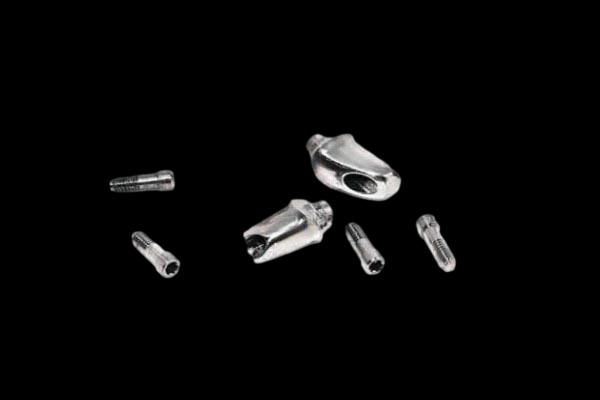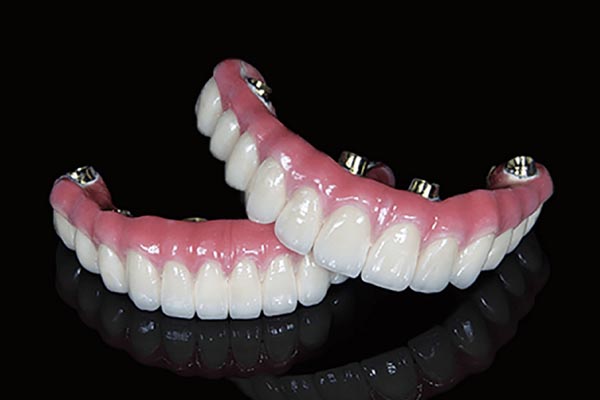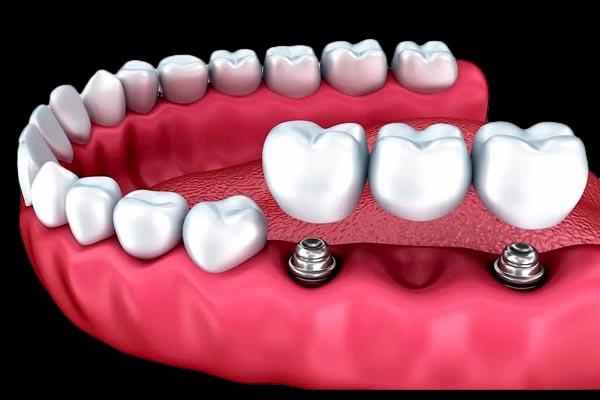
Customized Abutments are personalized dental prosthetic devices used in implant dentistry. They are individually designed and fabricated to match the unique needs and oral anatomy of each patient. These abutments offer precise fit, improved aesthetics, and long-term functionality. Through digital impressions and CAD/CAM technology, a virtual model is created and then physically produced using materials like titanium or dental-grade ceramics. Customized Abutments provide customization options in shape, size, angulation, and emergence profile, enhancing the overall aesthetics of dental restorations. They also address challenging clinical situations, promote better load distribution, and reduce the risk of complications, ensuring successful outcomes for patients.

Full Arch Implant refers to a comprehensive dental implant treatment that utilizes a series of implants to replace an entire arch of teeth. It is an advanced solution for individuals who have lost all their teeth or have severely damaged teeth in a complete dental arch. The treatment involves strategically placing multiple dental implants in the jawbone to create a stable foundation for a full set of artificial teeth. This approach provides patients with a fixed and functional set of teeth that closely replicate the natural appearance and functionality of healthy teeth. Full Arch Implants can significantly improve oral health, restore proper chewing and speaking abilities, and enhance overall aesthetics and self-confidence.

A Multi-tooth Implant is a dental procedure that involves the placement of multiple dental implants to replace several missing teeth. This advanced technique provides a long-lasting and functional solution for individuals with multiple missing teeth. During the procedure, several dental implants are strategically positioned in the jawbone, acting as artificial tooth roots. These implants provide a stable foundation for the attachment of prosthetic teeth such as crowns, bridges, or dentures. Multi-tooth implants offer improved chewing ability, aesthetic restoration, and preservation of jawbone health. This comprehensive treatment enhances oral function, smile aesthetics, and overall quality of life for patients with multiple missing teeth.
Dental implants are a popular and effective solution for replacing missing teeth. They are designed to function and look like natural teeth, providing a durable and long-lasting restoration option. In this article, we will explore the definition and characteristics of dental implants, their scope of application, the manufacturing process involved, their advantages, limitations, and important considerations.
Dental implants are prosthetic devices that are surgically placed into the jawbone to replace missing teeth. They consist of three main components: the implant, the abutment, and the dental crown. The implant is a small titanium post that serves as the artificial tooth root, providing stability and support. The abutment is attached to the implant and acts as a connector between the implant and the dental crown, which is the visible part of the replacement tooth. Dental implants are known for their strength, durability, and natural appearance.
Dental implants can be used to replace a single missing tooth, multiple missing teeth, or even a full arch of teeth. They are suitable for individuals with good oral health and sufficient bone density in their jawbone to support the implant. Dental implants offer a versatile solution for various cases of tooth loss, providing patients with improved aesthetics, functionality, and overall oral health.

The manufacturing process of dental implants involves several steps. First, a detailed treatment plan is created, which includes a comprehensive examination of the patient's oral health and the use of advanced imaging techniques to assess the jawbone structure. After the implant placement surgery, a healing period of a few months is required to allow the implant to fuse with the jawbone in a process called osseointegration. Once the healing is complete, an abutment is attached to the implant, and a customized dental crown is fabricated in a dental laboratory using advanced CAD/CAM technology. Finally, the crown is attached to the abutment and adjusted to ensure proper fit and function.
Dental implants offer several advantages over other tooth replacement options, including:
While dental implants have numerous advantages, there are some limitations and important considerations to keep in mind:
Dental implants provide a durable and natural-looking solution for replacing missing teeth. Their ability to restore functionality, aesthetics, and oral health makes them a preferred choice for many patients. While there may be limitations and important considerations, such as financial considerations and treatment time, working with a reliable and affordable dental lab or national dental lab network can help overcome some of these challenges. Consulting with a dental professional is essential to determine if dental implants are the right option based on individual oral health and needs.
We are committed to providing high-quality service and support.
We are dedicated to assisting you and respecting your privacy.
As a dental lab from china, we look forward to engaging with you to meet your requirements and provide the best possible solution.
If you have any questions, needs, or concerns, please feel free to contact us.